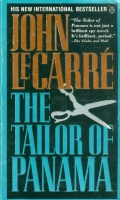kategóriák
- Közlekedés ajánlójegyzék
- Szocreál ajánlójegyzék
- Reklám ajánlójegyzék
- Fotó ajánlójegyzék
- Kínai-japán ajánlójegyzék
- Szentkép ajánlójegyzék
Új árakkal! - Új szentkép ajánlójegyzék II.
- 12 érdekes régiség
 Könyv
Könyv
 Bibliofilia
Bibliofilia
 Régiség
Régiség
 Metszet
Metszet
 Térkép
Térkép
 Fotó
Fotó
 Papírrégiség, Aprónyomtatvány
Papírrégiség, Aprónyomtatvány
 Plakát
Plakát
- Cirkusz
- Modern grafika
- Szocreál
- NER Irodalom
- Egyéb
kosár
üres a kosár
nincs bejelentkezve
Le Carré, John : The Tailor of Panama
- leírás
- további adatok
Tulajdonosi bélyegzéssel.
A címlap verzóján ceruzás jelölésekkel. John le Carre’s fifteenth novel begins as light entertainment and evolves into something darker. Harry Pendel is a half-Jewish, half-Irish Catholic orphan who takes the blame for his beloved Uncle Benny’s arson crime and goes to prison. Upon his release, Pendel goes to Panama to reinvent himself with a successful tailoring business, a loving wife, and two children. A bad business investment makes Pendel vulnerable to Andrew Osnard’s request that he spy on his customers, who include the nation’s leaders. The British are nervous about the United States turning over control of the Panama Canal and about possible Japanese influence on the future of international shipping. Pendel throws himself into the role of spy, taking fragments of truth and embroidering them into an opposition movement headed by his drunken friend Mickie Abraxas. Osnard is unaware of the deception until it is too late, just as Pendel and Osnard’s superiors do not realize the agent is stealing much of the money intended for Pendel’s supposed rebels. Pendel’s elaborate lies are amusing until he begins losing control of the situation. Soon, everyone he cares about is harmed in some way by his scheme. In Pendel and Osnard, le Carre has created two of his most memorable characters. Pendel is at once a con man, an artist, and a naive everyman, while Osnard is a more corrupt version of his protege. As usual, le Carre excels at showing self-deceiving intelligence professionals and bureaucrats working away blindly in the background. His achieving an almost perfect balance between the entertaining and the more serious sides of his story makes THE TAILOR OF PANAMA one of his most compelling novels.
A címlap verzóján ceruzás jelölésekkel. John le Carre’s fifteenth novel begins as light entertainment and evolves into something darker. Harry Pendel is a half-Jewish, half-Irish Catholic orphan who takes the blame for his beloved Uncle Benny’s arson crime and goes to prison. Upon his release, Pendel goes to Panama to reinvent himself with a successful tailoring business, a loving wife, and two children. A bad business investment makes Pendel vulnerable to Andrew Osnard’s request that he spy on his customers, who include the nation’s leaders. The British are nervous about the United States turning over control of the Panama Canal and about possible Japanese influence on the future of international shipping. Pendel throws himself into the role of spy, taking fragments of truth and embroidering them into an opposition movement headed by his drunken friend Mickie Abraxas. Osnard is unaware of the deception until it is too late, just as Pendel and Osnard’s superiors do not realize the agent is stealing much of the money intended for Pendel’s supposed rebels. Pendel’s elaborate lies are amusing until he begins losing control of the situation. Soon, everyone he cares about is harmed in some way by his scheme. In Pendel and Osnard, le Carre has created two of his most memorable characters. Pendel is at once a con man, an artist, and a naive everyman, while Osnard is a more corrupt version of his protege. As usual, le Carre excels at showing self-deceiving intelligence professionals and bureaucrats working away blindly in the background. His achieving an almost perfect balance between the entertaining and the more serious sides of his story makes THE TAILOR OF PANAMA one of his most compelling novels.
| állapot: |    |
| kategória: | Könyv > Idegennyelvű könyvek > Angol nyelvű > |
| kategória: | Könyv > Bestseller > Krimi > |
| kiadó: | Penguin Books, 1996 |
| cikkszám / ISBN: | 0063042009998 |
| kötés: | fűzve |
| oldalszám: | 415 |
| könyv nyelve: | angol |



























































 Telefon:
Telefon: E-mail:
E-mail:











